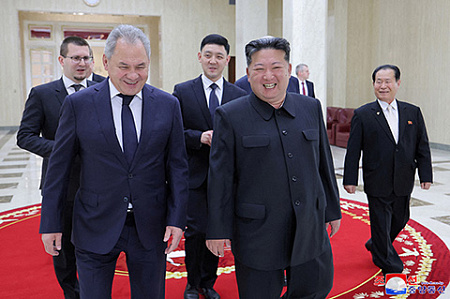
Russian Security Council Secretary Sergei Shoigu, on behalf of Russian President Vladimir Putin, flew to Pyongyang on Wednesday and met with North Korean leader Kim Jong Un. The visit was closely followed in neighboring South Korea, where new President Lee Jae-myung took office on June 4. He promised to improve relations with North Korea as much as possible.
Shoigu’s visit was a one-day visit. Shoigu was met at the ramp by several high-ranking North Koreans, including Deputy Chairman of the Central Military Committee of the WPK Marshal Pak Jong-chon and Deputy Foreign Minister of the DPRK Kim Jong-gyu. This alone speaks to the importance of the Security Council Secretary’s one-day visit to North Korea. Shoigu held talks with Kim Jong-un.
“During the conversation, which took place in an atmosphere of friendly understanding, issues of cooperation in various fields were discussed, and views were exchanged on the situation around the Ukrainian crisis and on the Korean peninsula,” the Russian Embassy in the DPRK said in a statement. As previously reported in the press service of the Russian Security Council, during the negotiations it was supposed to “discuss the implementation of certain points of the Comprehensive Strategic Partnership Agreement between the Russian Federation and the DPRK, as well as perpetuate the memory of the Korean fighters who helped in the liberation of the Kursk region.” The visit to Pyongyang was the latest for the Secretary of the Russian Security Council over the past few months.
The last time Shoigu flew to Pyongyang was in March. Large-scale bilateral contacts between the Russian Federation and the DPRK in 2025 will be no less than in 2024, when the Comprehensive Strategic Partnership Agreement between Moscow and Pyongyang was signed, Shoigu said at an international meeting of high-level representatives in charge of security issues in late May in the Russian capital. Relations between Russia and the DPRK are developing vigorously, he stressed.
Meanwhile, the South Korean press drew attention to the fact that Shoigu’s visit took place the day after the elections in that country. They were won by Lee Jae-myung, a proponent of the “solar heat policy” in relation to the DPRK. In addition, he does not hide the fact that he considers his country’s current relations with Russia to be too confrontational. At the same time, Lee Jae-myung acknowledged the justified concerns that exist in South Korea in connection with the rapprochement between the Russian Federation and the DPRK. Seoul fears that the North Koreans will receive (or have already received) Russian military technology.
However, it is not yet clear what kind of foreign policy steps Lee Jae-myung will take in this regard. It is significant, however, that the new president, by one of his first decrees, appointed the former ambassador to Moscow, Wee Son Lak, as head of the State Security Department of the Presidential Administration (equivalent to the assistant for Foreign Policy Affairs).
